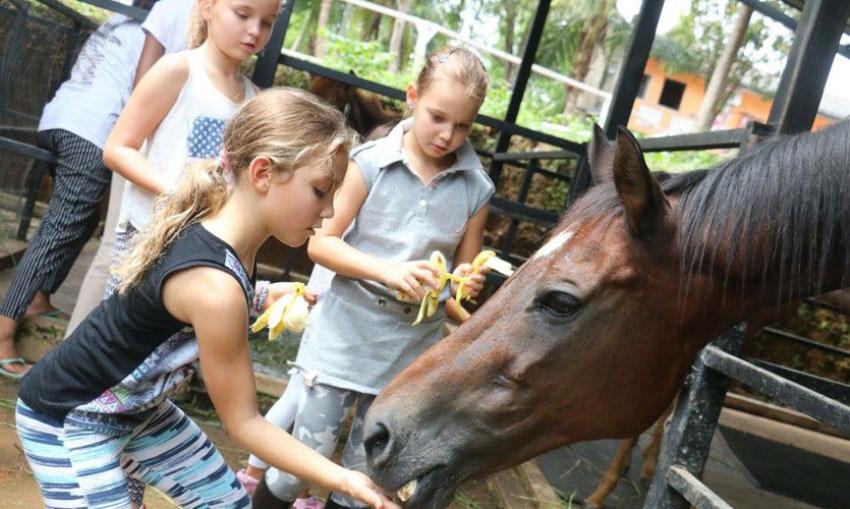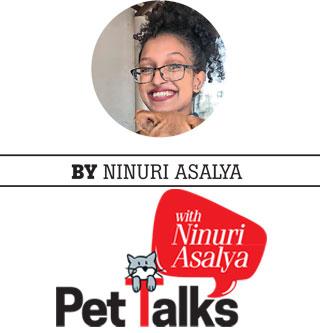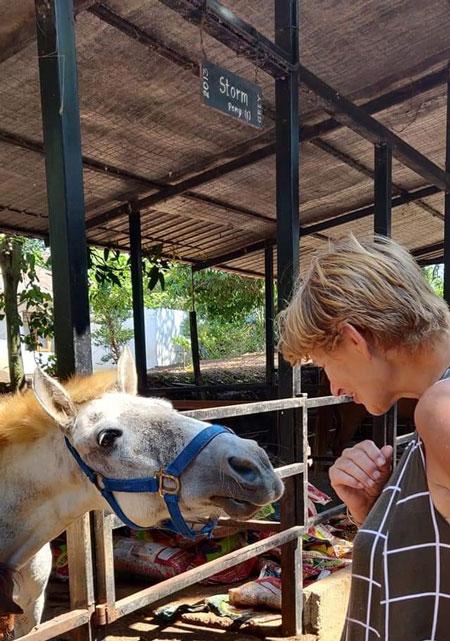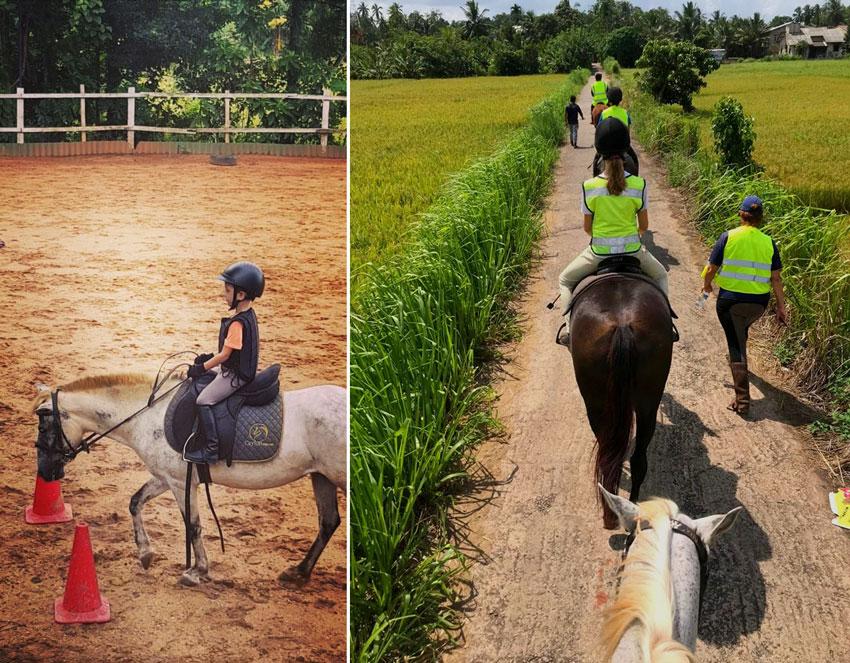24 Apr 2021 - {{hitsCtrl.values.hits}}

 For as long as I can remember, I’ve viewed stables and horse riding to be unethical and abusive. Just as I believe zoos to be cruel and inhumane, I believed them to be detrimental to animal welfare. I couldn’t fathom the need for either in the era of industrialization. With the little knowledge that I have on horses, I along with countless others have swiftly assumed them to be a form of animal abuse. The lack of education on the topic being a key factor here, what better way to shed some light onto the controversy than featuring an expert.
For as long as I can remember, I’ve viewed stables and horse riding to be unethical and abusive. Just as I believe zoos to be cruel and inhumane, I believed them to be detrimental to animal welfare. I couldn’t fathom the need for either in the era of industrialization. With the little knowledge that I have on horses, I along with countless others have swiftly assumed them to be a form of animal abuse. The lack of education on the topic being a key factor here, what better way to shed some light onto the controversy than featuring an expert.
Ceylon Riding Club, located at Gorakapitiya, was founded by Ineke Pitts and Swasha Malalasekera in 2017. Ineke, who grew up in England, had been horse riding since the age of ten, and had wanted to provide young people in Sri Lanka with the same opportunity. Ineke added that horse riders in the UK learnt the basic skills of horsemanship, given that grooms were an unavailable luxury. From mucking out stables and grooming horses to horse riding, she simply intends to pass it all on.
Ceylon Riding Club, following British Horse Society and Pony Club protocols, is the only riding school that focuses on ponies for teaching riding to youngsters. They do generous therapeutic work with special needs children, generally involving children on the autism spectrum and children with ADHD. To top it off, they conduct educational programs for horse owners and horse lovers, to ensure that horses would not unnecessarily suffer from pain or neglect.
I’m delighted to feature Ineke Pitts from Ceylon Riding Club for today’s piece on horses. To provide some context about Ineke, she is a consultant and entrepreneur who has lived and worked in Sri Lanka for over 25 years. She was previously the Director for MDF South Asia, where she also specialised in leadership development. She was instrumental in establishing the Sri Lankan Army first Cavalry Unit, together with Major Nalaka Buddhadasa in 2015.
Q. Needless to say, you're quite passionate about horses. How did this all begin?
 My mum took me for riding classes at the local riding school when I was ten years old. I fell in love with horses as many young children do. We couldn’t afford a horse of our own, so as soon as I was old enough, I took a share in my next door neighbour’s horse. He was a big old Irish Cob called Nimbus, who was a retired carriage horse. We would go on amazing adventures together in those days and I would often fall off trying to jump over a fallen tree, get back on again and come home, muddy and exhausted. My mum would send me straight upstairs to a hot bath and clean clothes. Still for most of my teenage years, I never felt happier than when I was up to my elbows in hay and straw and smelling of the stables!
My mum took me for riding classes at the local riding school when I was ten years old. I fell in love with horses as many young children do. We couldn’t afford a horse of our own, so as soon as I was old enough, I took a share in my next door neighbour’s horse. He was a big old Irish Cob called Nimbus, who was a retired carriage horse. We would go on amazing adventures together in those days and I would often fall off trying to jump over a fallen tree, get back on again and come home, muddy and exhausted. My mum would send me straight upstairs to a hot bath and clean clothes. Still for most of my teenage years, I never felt happier than when I was up to my elbows in hay and straw and smelling of the stables!
I took up riding again much later in life. So much had changed that I had to relearn everything. My first experience in Sri Lanka was riding in the Derby on Mount Lavinia Beach. I came third, but only when the unfortunate rider in front of me fell off. It was my first and last racing experience. Tremendously exhilarating, but not likely to be repeated.
Q. There is a large community in Sri Lanka that strongly believes horse riding to be unethical and abusive. How would you address this?
Horse and pony welfare, like all animal welfare in Sri Lanka needs the support of the Animal Welfare Bill. We especially would like to outlaw road racing of ponies which is cruel and dangerous, however we need the recognition and full support from the equestrian community to achieve this.
At Ceylon Riding Club, there are three unshakeable values that underpin everything we do (1) Rider safety and well-being (2) Horse welfare and happiness (3) Education at all levels. I have worked closely with equines for a big part of my life and will not be part of any activity that causes stress or pain to these animals. To assure that my horses are happy, I regularly update my knowledge and that of my staff.
Horses are herd animals, they need company and they need interaction with other horses to be happy. My horses live in open stalls where they can see and interact with one another. The saddles and bridles we use are carefully fitted to each horse and no one is permitted to ride our horses or ponies except under expert supervision. We continuously monitor the emotional as well as physical needs of the horses and ponies.
We invest a lot of our time to reach out to other horse and pony owners through our various social media channels. We post educational videos and tips and techniques on a daily basis. Our volunteer Hana from the Czech Republic recently made a series of instructional videos which were translated into Sinhala by Flavion Moses and posted on our pages. We hope that this will help more people to ride better and cause less harm or pain through bad riding techniques.
We work voluntarily with animal welfare groups where equines are involved. Sadly, neglect and cruelty is still too widespread and many die before we have a chance to intervene. One success story is our little rescue pony, Jeffrey who came to us starved and neglected. He was in such a bad state that we really didn’t expect him to make it. It took one month of daily gentle washing to remove years of impacted dirt from his coat and to slowly bring him up to a safe weight. He is now the mascot and the darling of the club (and also the naughtiest pony at the stables).
I’d advise the aforementioned community to educate themselves on horses first. Horses and ponies in Sri Lanka need to be domesticated as there are no facilities to keep horses in the wild. Horses need constant care, specialist feeding and specialist veterinarian support. Riding a horse is not cruel unless the horse is in discomfort. This is because horses genuinely like to work with people and ‘join up’ naturally, accepting a compassionate human leader without any coercion whatsoever.
Q. Tell us about the horses at Ceylon Riding Club.
There are fifteen horses and ponies at the Club, two of which are privately owned. The horses include two native Indian breed (Sindhi) horses, both bred in Sri Lanka at Anjali Stables, and three thoroughbred ex-racehorses. The rest are a mix of ponies and half-breed horses which are ideal for a riding school. Our horses are fed six times a day with a combination of horse feed, cattle feed, rice bran and dried grass. Each horse is groomed every day, sometimes several times. The stable is cleaned both in the morning and evening.

Q. Every parent dreads being asked which child is their favorite. Who is yours?
I had two horses that were extra special to me, one was called Merlin, a big old retired racehorse that helped me with leadership development work. He was a very wise old man. He died of a colic two years ago. I miss him a lot. Sometimes I sit by his grave and have a chat with him. The other special horse was Firefly, my first horse. She also died. She had a number of health challenges which developed into a neurological condition. In her last months, she would come into my office and stand next to my desk while I worked.
When you have a relationship like that with a horse, it is irreplaceable. I love all my horses – the ones I have known longest are always a bit extra special – that includes ex-racehorses; Tara who is 16 years, Kahedrin (Keddy) of 15 years, Valentina, our Sindhi horse and Lady, our oldest pony. Of course, I love them all, and each has a special rub on the head or scratch on the neck for when I do the late night feed. I love hanging out with them and having a little chat before saying goodnight.
Q. What happens in a day at the Ceylon Riding Club?
A typical day starts around 5.30am with the first feed of the day. The horses are then put out into the large arena to play and socialise for at least one hour and the ponies are let loose in the garden area. I meet with my volunteers for a coffee and a morning briefing while the ponies run and play and cause mayhem all around. The stable boys are busy sweeping the yard and mucking out the stables.
At around 6:45am, the grooms put out the saddles and bridles and bring the horses up from the field to be groomed in preparation for the morning lessons. Lessons start at 7am and continue every day except Monday, up till 11am when the horses are rested and given their second feed of the day. If there are no lessons, the horses are schooled under saddle or in-hand or lunged in a circle at the end of a rope.
Between 11am and 2pm, the hottest part of the day, the horses are rested in the stables and the staff take the opportunity for a quick nap themselves. At 2pm, there is another small feed, usually with grass this time and the horses are prepared for 3pm lessons. Afternoon lessons are between 3pm and 6pm after which the horses are given their fourth feed of the day. The final grass feed is at 10pm with a goodnight hug and lights out.
We have several ponies that are either too young or too old to be ridden in the school. We like to give them as much free time as possible. The older ponies only work with special needs children and for confidence building of nervous riders.
Q. What lies ahead for Ceylon Riding Club?
In 2020, we established the ‘Equestronauts’ Club, where young riders learn different skills and earn badges and certificates. A number of our young Equestronauts have completed or are completing their Duke of Edinburgh Award Scheme. In 2019, we also coached two of our young riders through their British Horse Society (BHS) Level 1 exams. In 2021 we launched ‘Equestrians’, which is a riding club for adults. In addition to horse welfare, riding and handling, club members will learn natural horsemanship skills. We will continue to train young riders and expand these clubs and associated activities.
We already conduct equine-assisted leadership development programs and look forward to expanding that as well as hippo-therapy for special needs children. Horses are particularly helpful for children on the autism spectrum and for ADHD. There is a growing need for these kinds of value-adding services.
Most important for our continued success, is the training of vets, grooms and instructors who are native to Sri Lanka. We rely heavily on our volunteers and it is time to bring on a new generation of Sri Lankan born horsemen and women to nurture the young riders and prepare them for international opportunities in dressage, show jumping and eventing.
Q. How can the public contribute to the Ceylon Riding Club?
If you would like to learn to ride, you can contact us for details of our riding memberships and special packages. If you are interested in horse welfare, we often get cases that require financial support. Most of all, we want to educate people about horses and ponies to prevent unnecessary suffering through ignorance or neglect. There are always opportunities to sponsor an event or equipment for the club and this helps us to provide more opportunities for young riders.
Finally, if you or your friends are thinking of buying a horse or pony, first find out what is involved. Come and learn how to take care of your animal and how to ride it safely and humanely before you buy one. We are always willing to help those who genuinely want to take equestrianism forwards in Sri Lanka.
I can’t say I’d ever ride a horse for pleasure, despite Ineke’s reassuring words. I’d dare say I harbor the same views as a few of my fellow activists, in saying that I truly wouldn’t get enjoyment out of horse riding as it’s struck our moral code, long before we had this conversation. This is undoubtedly as we’d rather not risk causing any pain or discomfort to an innocent animal in the slightest. As is apparent, this ties into our strong beliefs and stubborn moral compass.
Of course, most of us came to this conclusion having never properly ridden a horse or ridden one at all. Horse riding or owning a horse for a pet, which is quite popular in other countries, not being a common activity in Sri Lanka only furthers this. It’s entirely justified why we collectively decided that horse riding is abusive, having witnessed the public mistreatment of horses and ponies. The horrors we’ve seen in parks are an absolute travesty, and are an exact opposite of what it should be; which again beseeches the Animal Welfare Bill.
Having said so, we’ve never bonded with horses as Ineke has, had her field experience or education, or had grown up normalized to horse riding, viewing it as a leisure activity which both the rider and horse enjoys. Ineke’s passion and adoration for horses is endearing and entirely wholesome, and I’m certain it radiates to you through her words, as it did me. The good that she does for our horses and the equestrian community is incredible, as is the weight of her work in regards to the educational and therapeutic activities. And so, we wish her and the Ceylon Riding Club best of luck.
08 Jan 2025 1 hours ago
08 Jan 2025 2 hours ago
08 Jan 2025 3 hours ago
08 Jan 2025 4 hours ago